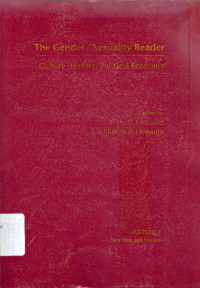
Text
The gender / sexuality reader: culture, history, political economy
The editors foreground here cross-cultural ethnographic and historical research by anthropologists, although our contributors also represent sociology, political science, economics, philosophy, biology, comparative literature, and-especially-history. The Gender/Sexuality Reader is a sophisticated survey of the best recent work on bodies and desires across cultures and through time. Foregrounding ethnographic studies and social history, this anthology brings together an unusually broad selection of essays across the disciplines--essays that link the typically segregated topics of desire, demography, and nationalism; bodily adornment and violence against women; colonialism, gender, race, and sexuality. The settings of these rich studies are diverse: the contemporary United States, haunted by spectres of race and sex; post-Maoist China, whose love affair with the commodity draws on images of white-skinned women; modern clinics and hospitals, where new medical technologies pose unprecedented dilemmas; sexual subcultures as diverse as the lesbian community of San Francisco and carnival worlds in Brazil; and historical periods ranging from classical antiquity to postmodern Egypt. The topics these essays treat are likewise diverse and engaging: eugenics in Singapore, the political and economic context of motherhood in Brazil, rape and the inner lives of black American women, sex/culture wars in the US, the precariousness of sexual identity--and its political implications--in Nicaragua, and media representations of Africa. These essays develop the insights of social constructionism, showing how gender, sexuality, and power are historically connected and practically intertwined. Taken together, they also extend the reach of this approach, concretely connecting gender/sexuality to class, race, and nation. Contributors make use of postmodernism's topical mobility and cultural studies' thematic range while--in the best of the social science tradition--never losing sight of biology, political economy, and history. The editors' introduction situates this ground-breaking, contemporary work in the rise of feminist, gay poststructuralist, and political-economic theories, and illuminates the changing political contestations at the heart of embodied desire.
Availability
| KP.II.000290 | KP.II LAN d | My Library | Available |
Detail Information
- Series Title
-
-
- Call Number
-
KP.II LAN d
- Publisher
- New York : Routledge., 1997
- Collation
-
573 hal ; 26 cm
- Language
-
English
- ISBN/ISSN
-
0415910056
- Classification
-
KP.II
- Content Type
-
-
- Media Type
-
-
- Carrier Type
-
-
- Edition
-
-
- Subject(s)
- Specific Detail Info
-
-
- Statement of Responsibility
-
-
Other version/related
No other version available
File Attachment
Comments
You must be logged in to post a comment
 Computer Science, Information & General Works
Computer Science, Information & General Works  Philosophy & Psychology
Philosophy & Psychology  Religion
Religion  Social Sciences
Social Sciences  Language
Language  Pure Science
Pure Science  Applied Sciences
Applied Sciences  Art & Recreation
Art & Recreation  Literature
Literature  History & Geography
History & Geography